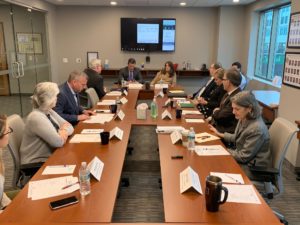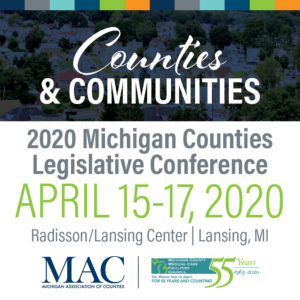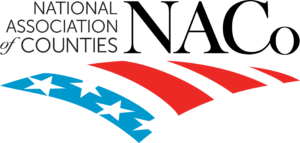DHHS budget receives mixed response in committee session

DHHS Director Robert Gordon
As Appropriations subcommittees began work this week on the FY21 budget, Department of Health and Human Services Director Robert Gordon presented on his department’s plans in the areas of education and skills; health and families; and climate and water.
While the DHHS budget, overall, is $26 billion, Gordon said the agency consistently has to do more with less. The Legislature has been concerned with spending in the past few budget cycles, specifically as it relates to the management of IT systems and significantly reined in the spending. Gordon discussed the number of freezes initiated on the IT development and increased financial oversight through a DHHS/DTMB governance board.
Deputy Director George Mellos also presented on the departments behavioral health system transformation project that would include new specialty integrated Medicaid plans. The department wants SIPs to manage physical and behavioral health for those with significant needs and allow the community mental health providers to provide safety net services.
Additionally, the director highlighted the governor’s recommendation to increase psychiatric staffing. Northern Michigan legislators reiterated their view of a need for a facility located in Northern Michigan. Rep. Sue Allor (R-Cheboygan) noted that patient transportation from northern counties to the Caro Center in Tuscola County can keep deputies away from other duties for several days.
Lastly, the department highlighted the $5.1 million (General Fund) increase in non-Medicaid funding to community mental health providers. This, however, is coming at the expense of a $5 million increase in the local match rate for counties. In FY20, the Legislature included $5 million to start phasing out the $25 million local match amount required under section 928. The governor reversed this trend in her FY21 budget and moved it to the non-Medicaid line. MAC supports the legislative initiative to phase out the local match requirement and will advocate to have it restored as the departmental budget moves through the Legislature.
For more information on this issue, contact Meghann Keit at keit@micounties.org.
MAC meets with leaders for clerks, treasurers, RDs
 MAC Board President Veronica Klinefelt and Executive Director Stephan Currie met this week with leaders of groups for Michigan clerks, treasurers and registers of deeds to discuss legislative priorities for 2020.
MAC Board President Veronica Klinefelt and Executive Director Stephan Currie met this week with leaders of groups for Michigan clerks, treasurers and registers of deeds to discuss legislative priorities for 2020.
MAC’s Deena Bosworth and Meghann Keit briefed on a variety of MAC priorities, ranging from extending the sunset on trial court fee authority to revenue sharing.
Also discussed were bills on the tax foreclosure process; legislation to allow pre-processing of absentee ballots in the wake of Proposal 3’s liberalization of absentee voting; legislation to waive renewal fees for concealed carry permits; and proposed changes to the Open Meetings Act.
“This was an excellent discussion on the numerous issues where our organizations’ members can collaborate for everyone’s benefit,” said Stephan Currie, MAC’s executive director.
MAC appreciates the county leaders who were able to attend in person or by teleconference:
- Michael Hanley, Saginaw County clerk
- Laura Brandon-Maveal, Gladwin County clerk and president of the Michigan Association of County Clerks
- Catherine McClary, Washtenaw County treasurer
- Patty Niepoth, Antrim County register of deeds
- Bob Robinson, Eaton County treasurer and second vice president of the Michigan Association of County Treasurers
- Stewart Sanders, Newaygo County register of deeds and president of the Michigan Association of Registers of Deeds
MAC launched these “county summits” in early 2019 to foster communication and cooperation among the various groups representing county government offices in Michigan. Next week, MAC will host leaders from the groups representing sheriffs and prosecutors.
Time to register for 2020 Legislative Conference
 The 2020 Michigan Counties Legislative Conference will feature a variety of speakers and events to enhance county officials’ learning and leadership skills.
The 2020 Michigan Counties Legislative Conference will feature a variety of speakers and events to enhance county officials’ learning and leadership skills.
Please note that this year’s conference runs Wednesday through Friday, April 15-17.
Among the highlights:
- Plenary sessions on legislative priorities, jail reform proposals and county revenue trends
- Remarks from senior state officials (Chief Justice Bridget McCormack will headline the panel)
- 12 workshops designed for MAC members and affiliates over three days.
- A Legislative Reception on Wednesday evening
- An Exhibitor Show Reception featuring complimentary beverages and snacks
The conference’s early-bird fee is just $350 for county members, which includes all commissioners, county administrators, medical care facility administrators, treasurers, prosecutors, sheriffs, clerks and registers of deeds. Please note: The early-bird rate ends on March 20, so register soon.
The conference hotel, the Radisson, is offering a special room rate of $135.95 for the event, and is connected to the main conference venue, the Lansing Center, by an enclosed pedestrian ramp.
Complete details are available in our handy Registration Packet.
Or you can begin your registration process by clicking this link. Please remember: All registrations are online only.
Fiscal training schedule stretches from Iron River to Lapeer
 Training sessions designed to help county leaders on capital project planning and general financial oversight will begin March 4 and continue through the summer.
Training sessions designed to help county leaders on capital project planning and general financial oversight will begin March 4 and continue through the summer.
The Fiscally Ready Communities team, a joint project of the state Treasury Department and MSU Extension, will lead the sessions on capital asset management and planning and general financial oversight!
Please note: These sessions are eligible for credit in MAC’s County Commissioner Academy program.
Each training is half-day and is FREE. The material is designed for basic to intermediate knowledge or a refresher course for those with advanced knowledge.
Dates and locations for capital planning sessions are:
- March 4 – Ann Arbor
- April 2 – Lapeer
- April 28 – Madison Heights
- May 14 – Kalamazoo
- June 11 – Grayling
- July 8 – Iron River
- July 9 – St. Ignace
- Sept. 9 – Saginaw
Plans also are being finalized for sessions in Big Rapids in August. Check the website for updates.
For times and venues, see the registration page. To register for the capital trainings, visit https://events.anr.msu.edu/FRC2020/
Additionally, the team will be leading one Financial Best Practices Overview training on Thursday, May 7 in Grayling, plus a webinar planned for the fall. This training was created in 2019 to provide local governments with information on best practices and policies and procedures.
To register for the high-level overview on May 7 in Grayling, visit https://events.anr.msu.edu/FRC2020/
Please check Michigan.gov/FiscallyReady for additional information.
State offers $250,000 in anti-blight grants to small counties
 The State Land Bank Authority has launched a second round of Michigan Rural Community Demolition Grants. Smaller communities in Michigan can apply for a $50,000 grant to help eliminate blight and revitalize their communities.
The State Land Bank Authority has launched a second round of Michigan Rural Community Demolition Grants. Smaller communities in Michigan can apply for a $50,000 grant to help eliminate blight and revitalize their communities.
The funds, available to Michigan county land banks and local units of government in counties with populations under 50,000, are designed to help communities remove vacant and abandoned structures from their neighborhoods and prepare for future developments that spark business investment and provide good jobs for residents. Applications are due Friday, March 13 at 5 p.m.
The maximum award per proposal is $50,000 and can be used toward vacant and abandoned, blighted commercial or residential structures. Proposals will be evaluated based on their anticipated impact in promoting public safety, enhancing economic development, public and private investment in the project and alignment with the community vision or other placemaking efforts.
For more information, visit Michigan.gov/LandBank.
 The Michigan Opioids Task Force and Michigan Department of Health and Human Services (MDHHS) are hosting a town hall Thursday, March 12, 5:30-6:30 p.m., at the Sterling Heights Community Center, 40250 Dodge Park Road.
The Michigan Opioids Task Force and Michigan Department of Health and Human Services (MDHHS) are hosting a town hall Thursday, March 12, 5:30-6:30 p.m., at the Sterling Heights Community Center, 40250 Dodge Park Road.
MDHHS and the Michigan Opioids Task Force will share its strategy to address the opioids crisis, seek information about how the opioid epidemic has impacted those in attendance and host a Q&A about the crisis response.
“Information gathered during this event and other town halls will help the state develop a crisis response that is flexible; effective to fit the needs of communities from Detroit to Grand Rapids to Marquette; and informed by the experiences of Michiganders affected by the crisis. About 150 people attended a similar town hall in Detroit in January,” said MDHHS in a statement.
Future sessions will be in:
- Gaylord on Friday, July 24
- Escanaba on Wednesday, July 29
- Flint on Friday, Sept. 25
- Grand Rapids on Friday, Nov. 6
For more information about the state’s opioids response and available resources, visit Michigan.gov/opioids.
Animal welfare grants issued to county shelters
 The Michigan Department of Agriculture and Rural Development (MDARD) is issuing $127,240 to 23 recipients of the 2020 Animal Welfare Fund grants. The grants help support the spaying and neutering of shelter dogs and cats to help them be more adoptable. Grants also help support many anti-cruelty and proper care programs and training around the state. Registered shelters also can receive assistance through the grant program for the unrecovered costs of care for animals involved in legal investigations.
The Michigan Department of Agriculture and Rural Development (MDARD) is issuing $127,240 to 23 recipients of the 2020 Animal Welfare Fund grants. The grants help support the spaying and neutering of shelter dogs and cats to help them be more adoptable. Grants also help support many anti-cruelty and proper care programs and training around the state. Registered shelters also can receive assistance through the grant program for the unrecovered costs of care for animals involved in legal investigations.
“The Animal Welfare Fund is supported by generous Michiganders during tax season when they check the fund’s box on Form 4642, Voluntary Contributions Schedule, with their state tax returns. Since 2010, MDARD has distributed more than $1.3 million to more than 185 local animal shelters. One hundred percent of the contributions made to this fund are used for Michigan animal welfare programs,” MDARD said in a statement.
Among county facilities receiving grants were:
- Cass County Animal Shelter – $10,000
- Gratiot County Animal Shelter – $5,000
- Kalkaska County Animal Shelter – $2,940
- Macomb County Animal Shelter – $1,490
- Newaygo County Animal Shelter – $874
- Roscommon County Animal Shelter – $10,000
- Saginaw County Animal Care Center – $8,000
- St. Clair County Animal Control Shelter – $6,000
- St. Joseph County Animal Shelter – $7,520
Please note that best practices for animal shelters will be the topic of a workshop at this year’s Legislative Conference in Lansing, April 15-17. For details on the workshop and registering for the conference, check out our Attendee Registration Packet.
For more information on the program, click here.

 National news from NACo
National news from NACo